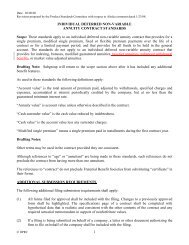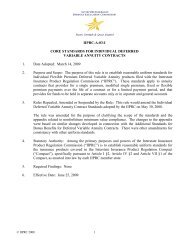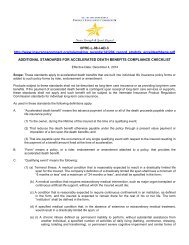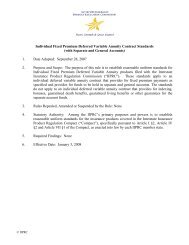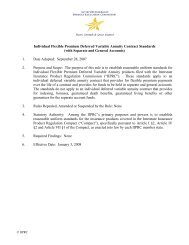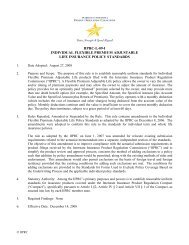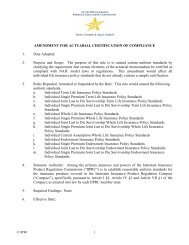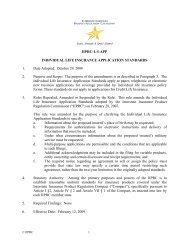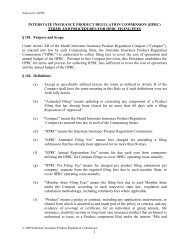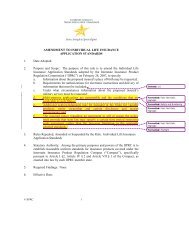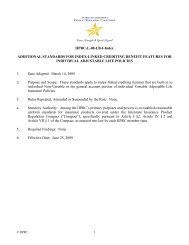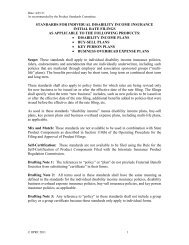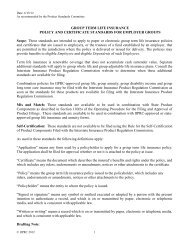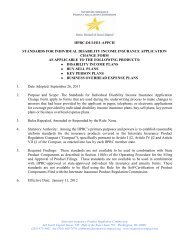core standards for individual long term care insurance policies
core standards for individual long term care insurance policies
core standards for individual long term care insurance policies
You also want an ePaper? Increase the reach of your titles
YUMPU automatically turns print PDFs into web optimized ePapers that Google loves.
Date: 7/13/10<br />
Under review by the Product Standards Committee<br />
Higlighted changes are those added since the 7/6 draft.<br />
APPENDIX B<br />
FRATERNAL BENEFIT SOCIETIES<br />
Fraternal Benefit Societies (“fraternals”) are subject to separate fraternal codes in all jurisdictions due to their unique<br />
structure, operations and legal obligations. The Drafting Notes included at the ends of the Scope, ARBITRATION<br />
and ENTIRE CONTRACT <strong>standards</strong>, the section entitled ADDITIONAL STANDARDS FOR FRATERNAL<br />
BENEFIT SOCIETIES, and Appendix B are included in the <strong>standards</strong> to allow fraternals to experience the<br />
benefits of participating in the single point of filing and review process that the IIPRC offers, without jeopardizing<br />
their ability to meet their unique obligations and to operate as required or permitted by law.<br />
By law, a fraternal is defined by five basic elements:<br />
1. one without capital stock;<br />
2. one conducted solely <strong>for</strong> the benefit of its members and their beneficiaries by providing life, health and annuity<br />
benefits and by operating one or more social, educational, charitable, patriotic, or religious purposes <strong>for</strong> the benefit<br />
of members and others;<br />
3. one that is a benevolent and charitable institution and not <strong>for</strong> profit;<br />
4. one operated on a lodge system that may carry out charitable and other activities; and<br />
5. one that has a representative <strong>for</strong>m of government with a governing body and direct election of its members.<br />
The laws governing fraternals impact the <strong>standards</strong> in several ways. Fraternals are required by law to issue <strong>insurance</strong><br />
contracts that incorporate the laws of the Society and the application <strong>for</strong> membership. Thus, the contract must<br />
consist not only of the policy or certificate issued, and the application <strong>for</strong> <strong>insurance</strong>, but also the application <strong>for</strong><br />
membership and the articles and bylaws. Further, the laws governing fraternals require or permit that the articles and<br />
bylaws address the structure of lodges, membership requirements, <strong>for</strong>m of governance, grievance procedures, and<br />
eligible beneficiaries. Any amendments to the articles or bylaws made after issuance of a certificate must be applied<br />
consistently to all members retroactively. However, no amendment shall eliminate or reduce contractual benefits.<br />
By law, fraternals are membership organizations. Because of this, the law refers to the <strong>insurance</strong> <strong>for</strong>ms issued to<br />
members of a fraternal as “certificates” or “certificates of membership and <strong>insurance</strong>”. Further, due to the<br />
membership requirements, fraternal certificates often include a provision stating that the insured and/or owner is a<br />
member and that the <strong>for</strong>m that has been issued to evidence coverage is a certificate of membership and <strong>insurance</strong>. In<br />
addition, fraternal certificates may include a Maintenance of Solvency provision setting <strong>for</strong>th the legal rights and<br />
obligations in the case of a fraternal’s financial impairment.<br />
© IIPRC 2010 26



